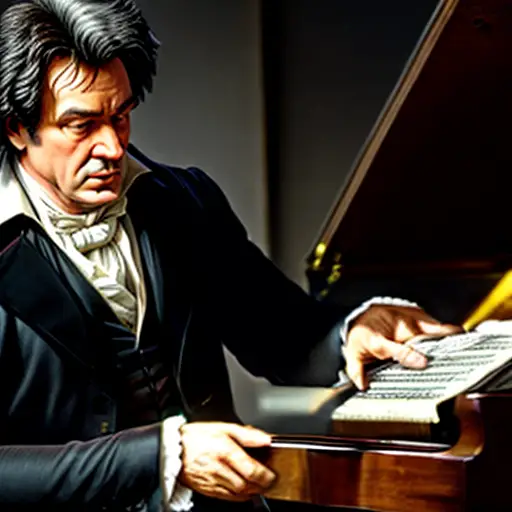Ladies and gentlemen, let's take a moment to appreciate the musical genius that was Ludwig van Beethoven. Before he became the iconic composer we all know and love, he embarked on a wild journey of instrumental exploration. From a young age, Beethoven dabbled with various instruments, like the piano, violin, and even the viola. Legend has it that he even attempted to play the French horn, but let's just say it wasn't exactly his forte. Nevertheless, Beethoven's relentless pursuit of musical excellence led him to master the piano, becoming a virtuoso who could tickle the ivories like no other. So, next time you listen to his enchanting compositions, remember the musical mishaps and triumphs that paved the way for Beethoven's extraordinary legacy.
Beethoven was a virtuoso pianist and considered one of the greatest pianists of his time. However, what many people don't know is that he was also a skilled violinist and violist. In fact, he often performed in string quartets, playing either the viola or the violin, showcasing his versatility and mastery of multiple instruments.
Let's dive into the world of Beethoven's piano prowess, where his true musical genius truly shines. While Beethoven experimented with various instruments throughout his life, it was the keyboard that truly captured his heart. From the delicate strokes of the harpsichord to the thunderous power of the grand piano, Beethoven's mastery of the keyboard was unparalleled. Legend has it that he could make the keys sing, dance, and even weep with emotion. His fingers danced effortlessly across the ivory, creating melodies that would echo through the ages. So, the next time you find yourself marveling at the beauty of Beethoven's piano compositions, remember the countless hours he spent perfecting his craft, transforming the keyboard into his own personal symphony.

Let's take a moment to appreciate Beethoven's command of orchestral instruments, as he truly was a symphony maestro. While Beethoven's primary instrument was the piano, his musical genius extended far beyond the keyboard. He had a deep understanding and appreciation for the entire orchestra, and he knew how to harness the power and beauty of each instrument to create breathtaking symphonies. From the majestic sound of the brass instruments to the delicate melodies of the woodwinds, Beethoven's compositions showcased his mastery of orchestration.
Beethoven's own experience as a violinist also played a significant role in his understanding of orchestral instruments. He knew the intricacies of the strings, the bowing techniques, and the expressive possibilities they offered. This knowledge allowed him to compose violin concertos that showcased the instrument's virtuosity and emotional range. Beethoven's violin playing skills undoubtedly influenced his compositions, as he knew exactly how to bring out the best in each instrument within the orchestra.
One cannot discuss Beethoven's command of orchestral instruments without mentioning his groundbreaking use of percussion. In his symphonies, he expanded the role of percussion instruments, incorporating them in ways that were previously unheard of. The thunderous timpani rolls, the sharp crack of the snare drum, and the triumphant crash of cymbals added a new dimension to his compositions, creating dramatic and powerful moments that still resonate with audiences today.
Beethoven's ability to weave together the diverse voices of the orchestra, from the soaring violins to the rumbling timpani, is a testament to his genius as a composer. His understanding of each instrument's capabilities allowed him to create symphonies that were both technically impressive and emotionally stirring. So, the next time you listen to one of Beethoven's symphonies, take a moment to appreciate the maestro's command of orchestral instruments and the timeless beauty he created through their harmonious collaboration.
Despite being a renowned composer, Ludwig van Beethoven was also an accomplished pianist and violinist. He was known for his exceptional skills on the piano, often dazzling audiences with his virtuosic performances. However, it is less known that Beethoven was also a skilled violinist and often performed as a soloist in his own violin concertos.
Let's delve into the realm of Beethoven's experimental instrumental ventures, where he pushed the boundaries of conventional music. While Beethoven was known for his mastery of the piano and orchestral instruments, he also had a curious and adventurous spirit that led him to explore unconventional instruments. One such instrument was the glass harmonica, a mesmerizing instrument that produced ethereal sounds by rubbing wet fingers on glass bowls. Beethoven was captivated by its haunting tones and incorporated it into his compositions, adding an otherworldly element to his music. Additionally, he experimented with the mandolin, an instrument typically associated with folk music, infusing its plucky melodies into his compositions to create a unique blend of classical and folk influences. Beethoven's willingness to venture beyond the conventional instruments of his time showcases his innovative spirit and his desire to constantly push the boundaries of musical expression.